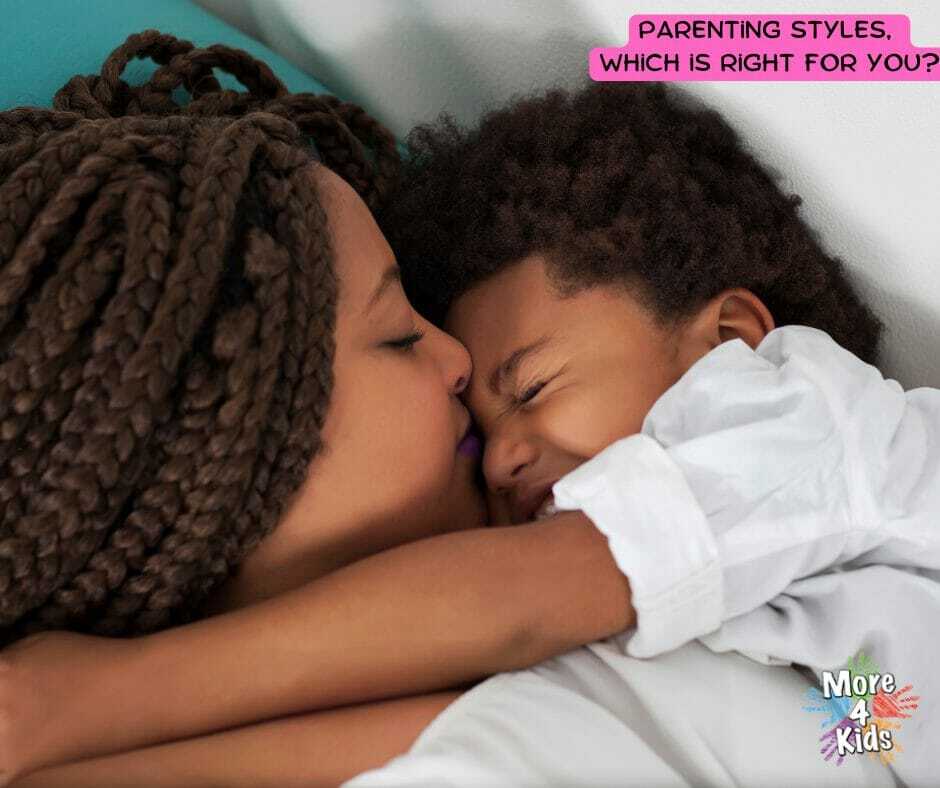Being a parent is one of the most challenging roles a person can take on. As parents we are responsible for guiding our child through life and helping them become the best version of themselves. Parenting styles are an essential part of this process, as they can influence our child’s development and future success. There are several different parenting styles, each with its own unique approach to raising children. For example, some parents prioritize structure and discipline, while others focus on nurturing and emotional support. Understanding the different parenting styles can help you make informed decisions that align with your values and parenting goals. By choosing the right parenting style, you can create a positive and supportive environment that helps your child thrive and reach their full potential. However, it’s important to remember that no parenting style is perfect, and it’s essential to be flexible and adaptable as your child grows and develops. In this article, we will explore the most common parenting styles and help you determine which one might be best for you and your family.
What are Parenting Styles?
Table of Contents
There are different types of parenting styles. Basically Parenting Styles refer to the ways in which parents or caregivers raise and interact with their children. These styles are based on the attitudes, beliefs, and behaviors that parents use to shape their child’s development, including their emotional, social, and cognitive growth. It’s important to note that these styles are not mutually exclusive, and parents may use a combination of different styles depending on the situation or the child’s needs. Additionally, there may be cultural or individual differences in parenting styles that can affect how they are expressed or perceived. Let’s go over some of the most common types of parenting styles.
Free-Range Parenting
Free-range parenting is of the the parenting styles that emphasizes independence and self-reliance in children. This style encourages children to explore their environment and take risks, and it focuses on developing children’s decision-making and problem-solving skills. One of the key benefits of free-range parenting is that it allows children to develop a strong sense of autonomy and confidence. When children are given the freedom to make choices and take risks, they learn to trust their own judgment and develop a sense of responsibility for their actions.
However, there are also potential downsides to this style of parenting. Without proper supervision and guidance, children may be exposed to unsafe or dangerous situations. Additionally, some children may not be comfortable with the level of freedom and responsibility that comes with free-range parenting.
Positive Parenting
Positive parenting is a parenting style that focuses on building a positive relationship between parent and child. This style emphasizes communication, mutual respect, and positive reinforcement, while aiming to create a warm and supportive environment for children to grow and develop. One of the key benefits of positive parenting is that it helps children develop a strong sense of self-esteem and confidence. When children feel loved and supported by their parents, they are more likely to have a positive self-image and a healthy sense of identity.
However, there are also potential downsides to this style of parenting. Without clear boundaries and expectations, children may struggle with discipline and may not learn important skills like self-control and responsibility. Additionally, some parents may find it difficult to strike a balance between being warm and supportive and being authoritative and consistent.
Helicopter parenting
Helicopter parenting is one of the many parenting styles where parents are overly involved in their child’s life, often to the point of micromanaging their every move. This style of parenting is characterized by over-protectiveness, which is driven by the parent’s desire to shield their child from any potential harm or disappointment. Helicopter parents are often found hovering over their child, closely monitoring their activities, and making decisions for them. While it is natural for parents to want to protect their children, helicopter parenting can have negative consequences for a child’s development. Children who are raised in this type of environment may become overly dependent on their parents, lacking the skills and confidence to make decisions on their own. They may also struggle to cope with setbacks or failures as they have been shielded from them throughout their childhood. Helicopter parenting can also lead to a strained relationship between parents and children. As the parent-child relationship becomes increasingly controlling, children may begin to feel resentful or frustrated. They may also struggle to establish their own identity and independence, as their parents have been making decisions for them all their life.
Overall, while it is important to be involved in your child’s life and protect them from harm, it is equally important to allow them the freedom to explore and learn from their experiences. By giving children space to make their own choices and learn from their mistakes, parents can help them build self-confidence, independence, and resilience.
Permissive Parenting
Permissive parenting is a style that is characterized by a lack of rules and limits. Parents who use this style are lenient and may avoid discipline altogether. They may be more focused on being their child’s friend than their parent. This parenting style can lead to children who lack self-discipline and have trouble following rules.
As a parent, it is important to strike a balance between being strict and being lenient. Permissive parenting can have negative consequences for a child’s development, but it is also important to show love and support. For example, if your child is struggling in school, it may be helpful to set boundaries around homework time and offer to help them study.
Authoritarian Parenting

While authoritarian parenting can be effective in some situations, it can also lead to negative outcomes. Children raised in this environment may become rebellious, lack self-esteem, and have trouble making decisions on their own. As a parent, it is important to set boundaries and enforce rules, but it is also important to allow your child to express themselves and make their own choices.
Authoritative Parenting

One of the key benefits of authoritative parenting is that it fosters independence and reasoning in children. Parents encourage their children to express opinions and discuss options, thereby promoting their decision-making skills. They also administer fair and consistent discipline when rules are broken, which helps children understand the consequences of their actions.
However, authoritative parenting is not without its challenges. While these parents have high expectations, they also need to be flexible and adapt their approach depending on the situation and their child’s needs. This requires a deep understanding of their child’s behavior and the ability to adjust their response to extenuating circumstances.
Comparing Authoritative and Authoritarian Parenting
Authoritative parenting and authoritarian parenting are parenting styles that can be contrasted. Authoritarian parenting is characterized by exceedingly high expectations with little warmth and guidance. Authoritarian parents enforce rules strictly and may use punishment as a primary means of discipline. They have little involvement in their child’s life, focusing more on obedience and control rather than nurturing and guidance which is what authoritative parenting does.
For instance, consider a situation where a child steals candy from a store. An authoritative parent would administer a fair punishment, such as grounding the child and requiring them to return the candy and apologize. They would also discuss why stealing is wrong and encourage the child not to repeat such behavior. On the other hand, an authoritarian parent might yell at the child, administer physical punishment, and send the child to their room without dinner, without explaining why the child’s actions were wrong.
In summary, while both authoritative and authoritarian parenting styles involve setting rules and expectations, they differ significantly in their approach to discipline and emotional support. Authoritative parenting, with its balance of high expectations and emotional warmth, is generally considered more beneficial for a child’s development. However, it’s important for parents to adapt their parenting style to their child’s unique needs and personality.
Gentle Parenting
Gentle parenting is a research-backed approach that centers on the bond between parents and their children. This parenting style is built on four key principles: empathy, respect, understanding, and boundaries.
Empathy in Gentle Parenting
Empathy in gentle parenting means recognizing and validating a child’s feelings and experiences. It involves tuning into your child’s emotions and responding to them with compassion and understanding. This approach can help children feel seen and heard, which can strengthen the emotional bond and promote healthy emotional development.
Respect in Gentle Parenting
Respect is another vital component of gentle parenting. This involves acknowledging your child as an individual with their own thoughts, feelings, and needs. It’s about recognizing your child’s autonomy and respecting their rights and boundaries. This approach can help children develop a robust sense of self-esteem and respect for others.
Understanding in Gentle Parenting
Understanding in gentle parenting encourages parents to learn about typical developmental expectations for children and to create an environment where children feel heard and understood. This involves being patient with your child, taking the time to listen to them, and trying to see things from their perspective. This approach can help children feel valued and understood, which can promote their emotional and social development.
Boundaries in Gentle Parenting
Boundaries are crucial in creating a healthy, loving, and stable environment while fostering independence, expression, and feelings of comfort and safety. Gentle parenting involves setting clear and consistent boundaries, but doing so in a way that respects the child’s autonomy. This approach can help children develop a sense of security and self-discipline.
Gentle Parenting vs. Authoritarian Parenting
Gentle parenting is often contrasted with more authoritarian styles of parenting. While authoritarian parents enforce rules strictly and may use punishment as a primary means of discipline, gentle parents discipline their children to educate them rather than punish them for their behavior. This approach uses connection, communication, and democratic methods to make decisions as a family.
The Benefits and Challenges of Gentle Parenting
There are numerous benefits to gentle parenting. Research suggests that this approach can reduce anxiety, improve the parent-child bond, and foster positive social skills. However, like any parenting style, gentle parenting is not without its challenges. It requires patience, empathy, and consistency, and it may not be suitable for every child or family.
In summary, gentle parenting is a compassionate and respectful approach to raising children. It emphasizes empathy, respect, understanding, and boundaries, and it can help foster a strong emotional bond between parent and child. However, it’s important to remember that no parenting style is perfect, and it’s essential to be flexible and adaptable as your child grows and develops.
Attachment Parenting

One potential downside of attachment parenting is that it can create a sense of dependency in the child that may make it difficult for them to develop independence and self-reliance as they grow older. Additionally, the intense focus on meeting the child’s needs and constantly being available to them can be emotionally and physically draining for parents, potentially leading to burnout and strain on the parent-child relationship.
My Personal Parenting Style Examples
As a parent, I have found that a combination of different parenting styles works best for my children. I tend to use the free range style to encourage my children to explore their interests and pursue their passions. For example, when my son showed an interest in music, I encouraged him to take piano lessons and attend music camps. I also provided him with opportunities to perform in front of audiences, which helped him gain confidence and develop his skills. At the same time, I also use authoritarian parenting, without the physical discipline, to set boundaries and teach them that there are consequences for their actions. For example, I expect them to do their best in school, be respectful to others, and follow our family’s values and beliefs. I also set boundaries around screen time and enforce rules around bedtime and homework.
Effectiveness of My Parenting Style
I have found that my parenting style has been effective in helping my children develop their identity. They are curious and engaged in exploring their interests, but also understand the importance of meeting expectations and following rules. They have a strong sense of self and are confident in pursuing their passions. However, I also recognize that every child is different, and what works for one child may not work for another. As a parent, it is important to be flexible and adaptable to your child’s needs and personality. It is also important to be reflective and evaluate your parenting style regularly to ensure that it is effective and meeting your child’s needs.
Parenting styles play a significant role in the way children develop their identity. As a parent, it is important to understand the different styles and choose an approach that works best for your child. The free-range, positive, permissive, authoritarian, helicopter and attachment style each have their own strengths and weaknesses. It is always important to find a balance that works for your family. Personally, I have found that a combination of free range and authoritarian style works best for my children. However, every child is different, and it is important to be flexible and adaptable in your parenting style. By providing your child with guidance, support, and opportunities to explore their interests, you can help them develop a strong sense of self and a clear sense of purpose in life.
In addition, it is important to recognize that no one parenting style is perfect or suitable for every child or family. While attachment parenting may work well for some families, it may not be the best fit for others. Parents should consider their own needs, limitations, and values when deciding on a parenting style and be willing to adjust their approach as their child grows and develops. Also for parents with more than one child, parenting styles may vary. Just because free range works for one child, does not mean it will work for all. Knowing each child’s personality helps to develop the best parenting style. Ultimately, the goal of parenting should be to create a nurturing and supportive environment that allows children to thrive and reach their full potential. By balancing their child’s needs with their own, parents can raise happy, healthy, and well-adjusted children who are equipped to handle the challenges of life.
Comprehensive Summary of Parenting Styles
| Parenting Style | Key Principles | Benefits | Potential Downsides |
|---|---|---|---|
| Free-Range | Emphasizes independence and self-reliance. | Fosters autonomy and confidence. | May expose children to unsafe situations. |
| Positive Parenting | Focuses on communication, mutual respect, and positive reinforcement. | Builds self-esteem and confidence. | May lack clear boundaries and expectations. |
| Helicopter | Overly involved in child’s life, micromanaging every move. | Protects children from harm. | Can make children overly dependent and strain parent-child relationship. |
| Permissive | Lenient, avoids discipline, focuses on being a friend. | Creates a relaxed environment. | Can lead to lack of self-discipline and rule-following. |
| Authoritarian | Emphasizes obedience and discipline, often uses punishment. | Effective in some situations for maintaining order. | May lead to rebellious behavior and low self-esteem. |
| Authoritative | Balances high expectations with emotional warmth. | Fosters independence and reasoning. | Requires flexibility and deep understanding of child behavior. |
| Gentle Parenting | Built on empathy, respect, understanding, and boundaries. | Reduces anxiety, improves parent-child bond. | Requires patience, empathy, and consistency. |
| Attachment Parenting | Emphasizes strong emotional bond, practices like co-sleeping. | Builds a strong emotional bond. | May create dependency and can be draining for parents. |
| Uninvolved/Neglectful | Limited emotional involvement, minimal supervision. | None. | Negatively impacts child’s emotional and physical well-being. |
| Mindful Parenting | Focuses on being present and mindful in interactions with children. | Enhances emotional well-being and reduces stress. | Requires constant self-awareness and can be emotionally draining. |
| Slow Parenting | Encourages simple living and spending quality time over quantity. | Builds strong family bonds and reduces stress. | May be challenging to implement in a fast-paced lifestyle. |
| Tiger Parenting | High expectations, strict discipline, and focus on academic excellence. | May lead to high academic achievement. | Can cause stress, anxiety, and poor social skills. |
| Snowplow Parenting | Removes all obstacles from the child’s path. | Makes life easier for the child in the short term. | Fails to teach resilience and problem-solving skills. |
Parenting Styles FAQ
What are the different parenting styles?
Parenting styles are the ways in which parents or caregivers raise and interact with their children. The most common styles include free-range, positive, permissive, authoritarian, helicopter, and attachment parenting. Each style has its own unique approach, strengths, and weaknesses, and parents may use a combination of different styles depending on the situation or the child’s needs.
How can I determine the best parenting style for my child?
Understanding the different parenting styles can help you make informed decisions that align with your values and parenting goals. It’s important to remember that no parenting style is perfect, and it’s essential to be flexible and adaptable as your child grows and develops. Consider your child’s personality, your own needs, limitations, and values when deciding on a parenting style.
What is free-range parenting?
Free-range parenting is a style that emphasizes independence and self-reliance in children. It encourages children to explore their environment, take risks, and develop decision-making and problem-solving skills. However, without proper supervision and guidance, children may be exposed to unsafe situations.
What is the difference between positive parenting and helicopter parenting?
Positive parenting focuses on building a positive relationship between parent and child, emphasizing communication, mutual respect, and positive reinforcement. On the other hand, helicopter parenting involves parents being overly involved in their child’s life, often to the point of micromanaging their every move. This can lead to children becoming overly dependent on their parents and lacking the skills and confidence to make decisions on their own.
What are the potential downsides of permissive parenting?
Permissive parenting is characterized by a lack of rules and limits, with parents often avoiding discipline altogether. This style can lead to children who lack self-discipline and have trouble following rules. It’s important for parents to strike a balance between being strict and being lenient.













Add Comment